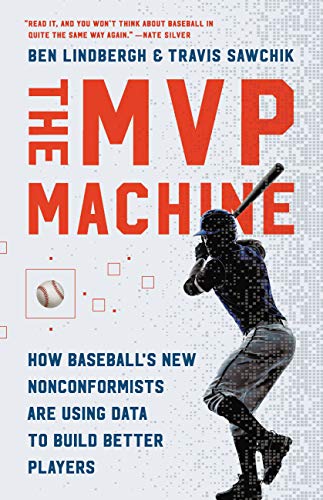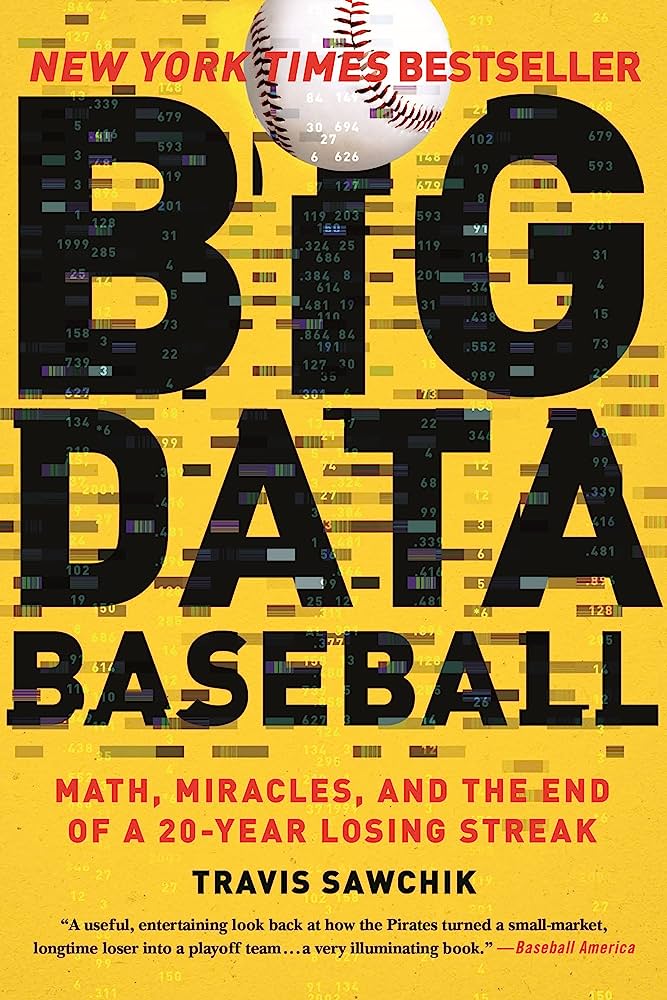Ironically, the modern adoption of analytics in baseball can be traced back to a baseball analytics book: Moneyball: The Art of Winning an Unfair Game by Michael Lewis. And other vintage baseball analytics books like The Sinister First Baseman by Eric Walker are what inspired the Oakland Athletics in the first place.
However, the term “sabermetrics,” (as baseball analytics is sometimes called) was coined by Bill James in 1980. But this pursuit of objective knowledge has long existed in baseball, evident even in the 1900s when individual player statistics were distinguished from team statistics.
Now, if you’re eager to delve into the world of baseball analytics, it’s essential to know the best books on the subject. Here’s our handpicked list, ready to satisfy your analytical cravings.
Best Baseball Analytics Books
#1. The MVP Machine: How Baseball’s Nonconformists Are Using Data to Build Better Players
The MVP Machine: How Baseball’s Nonconformists Are Using Data to Build Better Players
by Ben Lindberg and Travis Sawchick
In The MVP Machine, Ben Lindbergh and Travis Sawchik announce the end of the Moneyball era and usher in the next revolution in Major League Baseball. Every front office now embraces a data-driven approach, erasing the advantage once held by astute teams in valuing past performance. Their behind-the-scenes reporting reveals remarkable insights, from the Astros and Red Sox leveraging advanced technology to underdog players transforming into sluggers and MVPs.
The book tracks the journey of pitcher Trevor Bauer and examines how new analytical tools revolutionize pitching and hitting techniques. It showcases how baseball’s brightest minds now prioritize outdeveloping opponents, transforming fringe hitters, resurrecting written-off pitchers, and revolutionizing coaching and scouting. Brace yourself for an enthralling glimpse into the future of baseball.
#2. Big Data Baseball: Math Miracles and the End of a 20-Year Losing Streak
Big Data Baseball: Math Miracles and the End of a 20-Year Losing Streak
by Travis Sawchick
In Big Data Baseball, Travis Sawchik reveals the extraordinary journey of the 2013 Pittsburgh Pirates. Amidst two decades of losses, the team embraced radical big-data strategies to break their losing streak, secure a playoff spot, and transform their fortunes. Sawchik takes us behind the scenes, showcasing key figures like manager Clint Hurdle and GM Neal Huntington, who led the charge in embracing analytics.
#3. The Extra 2%: How Wall Street Strategies Took a Major League Baseball Team from Worst to First
In The Extra 2%, Jonah Keri recounts the inspiring story of the 2008 Tampa Bay Rays, a struggling Major League franchise that defied all expectations under the leadership of three finance prodigies. By implementing strategies honed on Wall Street, they transformed the team from perpetual underdogs into World Series contenders.
#4. A Fan’s Guide to Baseball Analytics: Why WAR, WHIP, wOBA, and Other Advanced Sabermetrics Are Essential to Understanding Modern Baseball
A Fan’s Guide to Baseball Analytics is an essential resource for fans of all ages, breaking down the complex world of modern baseball statistics into easy-to-understand sections on pitching, fielding, and hitting. While traditional stats like batting average and wins may be ingrained in our minds, this guide reveals the true value of metrics such as wOBA and WHIP, which are shaping the present and future of the game.
#5. Winning Fixes Everything: How Baseball’s Brightest Minds Created Sports’ Biggest Mess
Winning Fixes Everything unveils the shocking descent into corruption of the Houston Astros, brought to light by the investigative reporting of Evan Drellich. Drawing from his extensive interviews, Drellich unravels the rapid transformation of this once revered baseball team into a profit-driven machine under the leadership of ex-general manager Jeff Luhnow, whose relentless pursuit of cost-efficiency and innovation led to one of the most notorious cheating scandals in baseball history. This definitive account exposes the dark underbelly of modern baseball, punctuated by unchecked ambition, questionable hiring practices, and an underlying corporate culture that sacrificed integrity for financial gain. While the Astros’ tarnished legacy has come at a heavy cost, “The Astros Way” unfortunately illustrates a more profound shift in the sport, showcasing a baseball world that is increasingly susceptible to such pitfalls.




